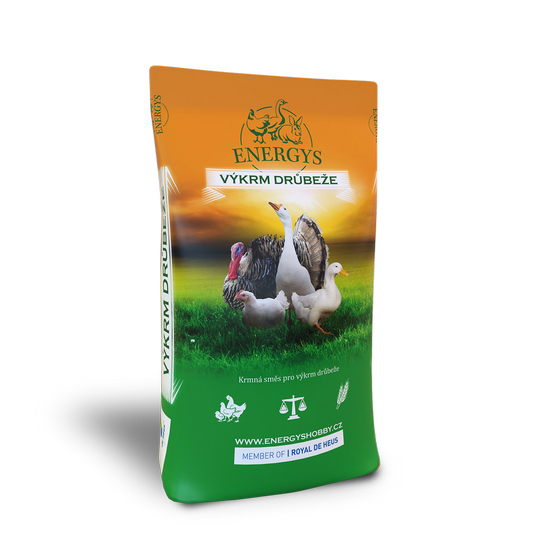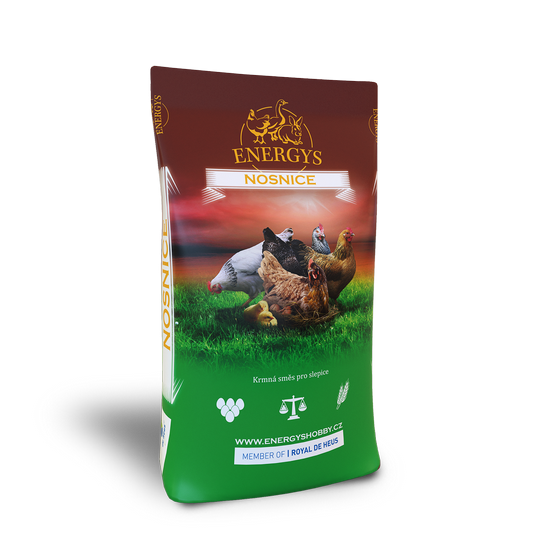Rabbits
Poultry
Laying hens
Quails
Guinea pigs
Pigs
Ostriches
Sheep and goats
Pigeons
Pheasants
Forest animals
HENS AND LAYING
The popularity of raising chickens in household conditions has been rising in recent years. This trend may be due to several factors, one of these surely being the search of high-quality foods, a more sustainable lifestyle and desire for greater independence. Breeding chickens at home also allows owners to control the animals’ living conditions and quality of feed they provide. For some people, it is important to know what their animals eat, and they prefer foods produced under their own supervision. In this article, we will focus on hens, eggs laying and egg quality.
When do hens start laying?
Hens usually start laying eggs at about 5 to 6 months of age, but this may depend on the breed. How long the hen will continue to lay eggs largely depends on genetics, its age and the care provided by the breeder. The laying period may last from several months to several years, but egg production tends to be highest during the first two years of laying, after which it may decline gradually. Eggs are most often laid in the morning.
Laying dormancy
In the autumn and winter months, hens may experience a period of so-called laying dormancy, because of the shortened daylight hours. During this period, hens tend to lay fewer eggs, or none at all. During laying dormancy, the hen’s body rests and regenerates, which contributes to maintaining the hens’ overall health and wellbeing. As soon as daylight hours begin to lengthen, the hens will start laying eggs again.
What to do if the hen sits on the egg?
When hens start sitting on eggs, this is normal behaviour associated with the desire to hatch chicks. Professionally, we refer to this behaviour as “brooding”. A hen exhibiting this behaviour is often called a “brooder”. If you plan to raise new chicks, it is important to provide a suitable environment for the hen to lay eggs and then brood. Place several available nests and make sure they are quiet and safe. Laying is part of the hens’ natural behaviour. After laying, the hen sits on the eggs for approximately 21 days. Chicks hatch right around day 21, but even this can be affected by various factors, including ambient temperature and humidity. After hatching, chicks require special care, which includes a warm area and appropriate feed.
If you do not want to raise new chicks, brooding may be undesirable as hens do not lay eggs during this time. If the brooding seems excessive, it may be a sign of stress or a deficiency of certain nutrients in the feed, such as a lack of protein, vitamins A, D, E or K, or an inappropriate calcium ratio in the feed. Therefore, we recommend providing laying hens with a high quality feed with higher protein content and adding calcium where appropriate.
What are hens lacking if they eat their own eggs?
This behaviour may be a sign of unbalanced feed. Hens that eat their own eggs may suffer a deficiency of certain nutrients. Usually, the problem may be a lack of essential amino acids, the minerals calcium and zinc, or they may also be lacking vitamins D and K, which affect calcium metabolism. Alternatively, vitamins B3 (niacin) and B7 (biotin) may also be deficient. However, it is important to point out that a number of other factors, including stress or improper breeding conditions, may also cause hens to eat their eggs.
Care for chicks
Generally, hens raise their chicks for several weeks to months after hatching. Chicks may start being weaned from laying hens around the 6th to 8th week of life. It is advisable to provide the chicks with a good quality and balanced feed specifically designed for raising chickens. The feed mixture should contain the necessary nutrients, vitamins and minerals to support growth and development.
Related products

POULTRY UNI 30
A mashed concentrate for fattening of all categories of poultry, which includes the highest quality soja. It is mixed with cereals in a ratio of 20-40% (by type or phase of fattening). It contributes to fast growth and a high meat content. It does not contain coccidiostats.

LAYER REPRO
Granulated feed for laying hen breeds. Supports higher hatching rates and the successful development of the embryo. Higher content of chosen substances). The laying hen must have access to an adequate amount of potable water.

LAYER GOLD
Granulated feed for laying hens when laying. Supports high laying eggs with a solid shell and a beautiful yolk color. It follows the feeding of the Chicken MIDI mixture. Indicative feed consumption per 1 year ranges from 50-60 kg / piece.

LAYER KLASIK
A powered feeding mix intended for laying hens. With its rough shredded structure it contributes to maximum usability.

CHICKEN MIDI
From the 5th week to the end of the 20 week old chickens. It follows on from feeding with the Chicken MINI feed. Through its make up it helps in the correct development of the organism and with future high usability. It doesn’t contain coccidiostats. It is produced in two forms, granulated and powder.

CHICKEN MINI
A crumbled compound feed without anti-coccidiosides. Suitable for reared chickens of the laying hen type till the end of their 4 weeks of age. It contains a balanced ratio of nutrients supporting the correct development of chickens. For weaning chickens the following mix is CHICKEN MIDI.
